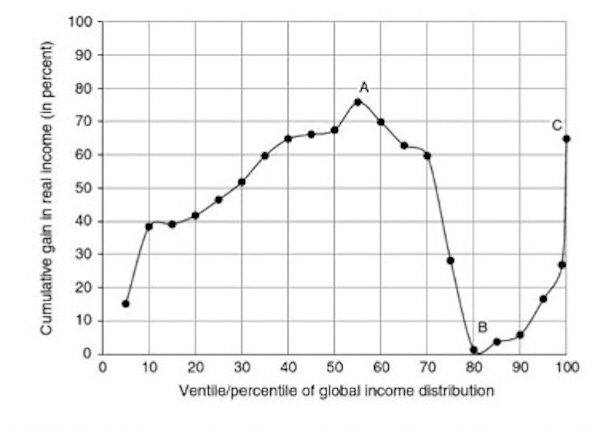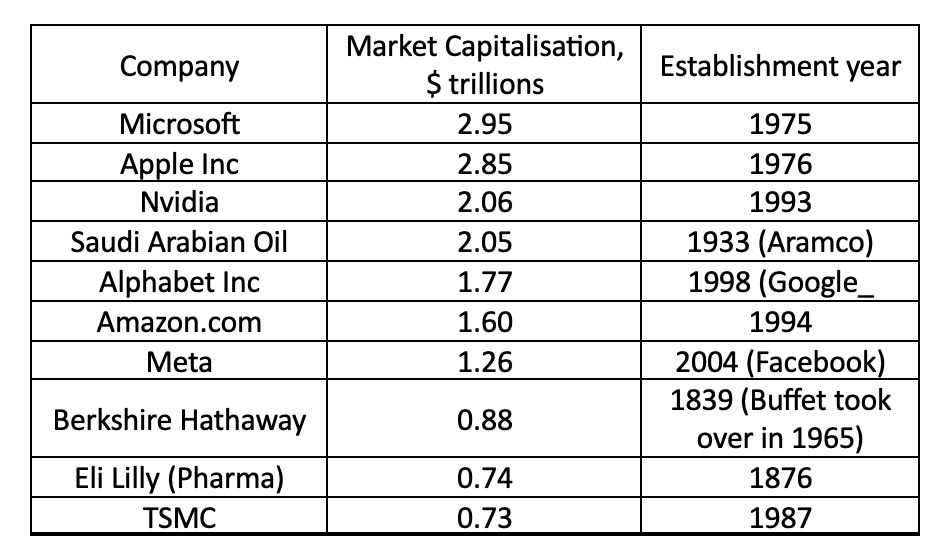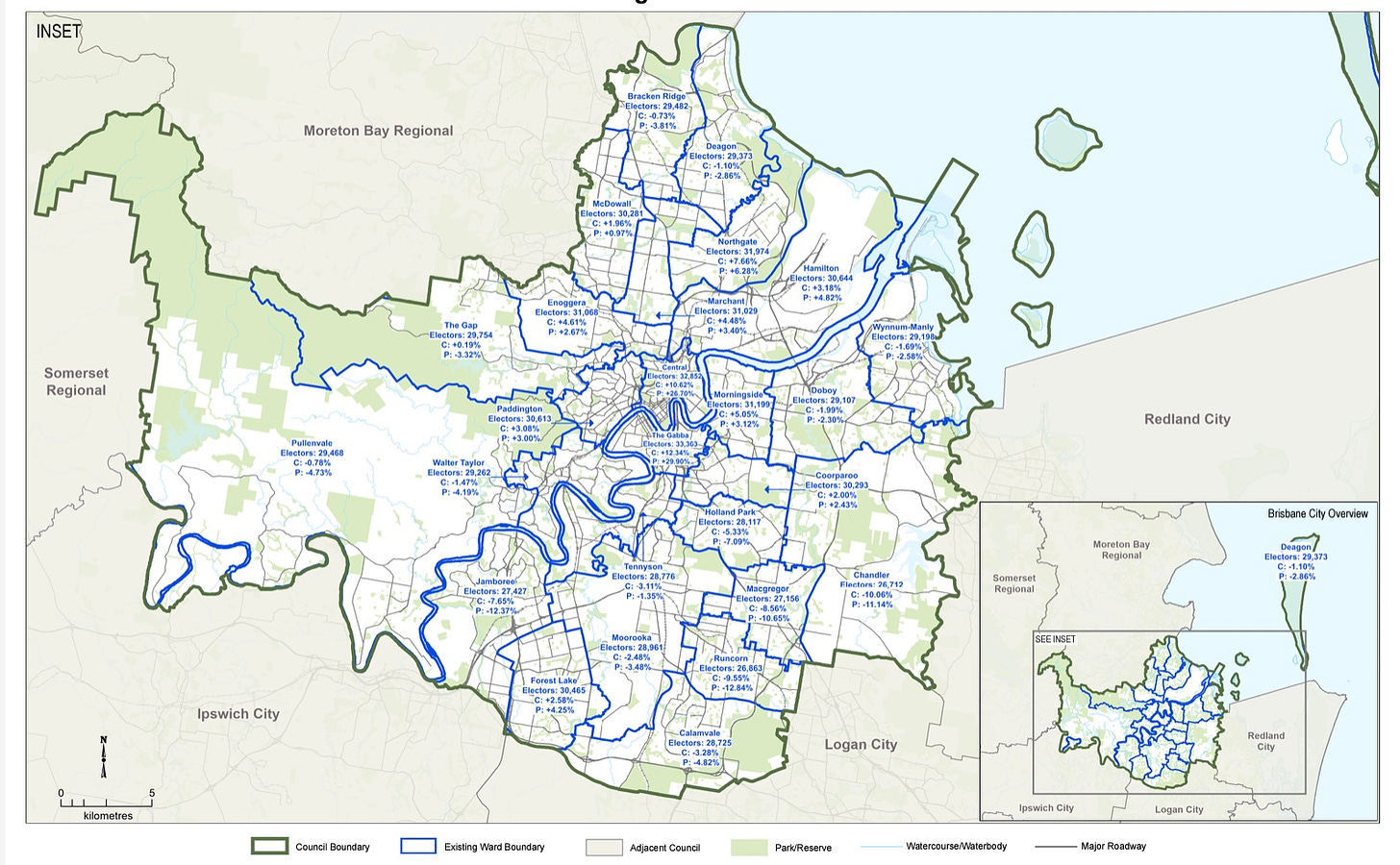Beyond the Echo Chambers: A Deeper Look at Social Unrest
Social Media has many faults but there are other more fundamental reasons for the unrest in America, UK and some other developed nations
Please subscribe; please share. This blog will always be free but worthy reading.
Copy and share the link, post it on another platform. It is not that I get money with more subscribers, but it makes me happy when more people read it. Vanity is a funny thing.
-+-+-+-+
My last post started with the intention to write about information overload but then I digressed. This happens when I do not have a clear path in my mind when I start writing. Then the words carve their own path and I follow.
My starting point then was Gurwinder's analogy between sugar and information. This is a cute and probably accurate analogy but not enough to explain to malaise facing the Western societies and some other parts of the world.
Attributing the entirety of the social unrest to socıal media echo chambers would be an oversimplification of a much broader phenomenon.
In today’s digitally driven world, the role of social media in shaping political and social discourse is frequently debated. While many point fingers at these platforms for creating a fractured landscape in countries like the USA and the UK, the issue at hand extends far beyond the realms of online interaction. Social media, with its attention-maximizing algorithms, has indeed fashioned echo chambers, encapsulating users in a loop of similar opinions and skewed perceptions of opposing viewpoints. However, attributing the entirety of the social unrest to these echo chambers would be an oversimplification of a much broader phenomenon.
Contrasting examples like Australia and New Zealand show us that similar social structures can exist with relative immunity to the supposed corrosive effects of social media. This disparity suggests that the turmoil, where present, has a deeper cause. I believe it stems from a complex interplay of the following four key outcomes all triggered by the rapid, revolutionary advances in information and communication technologies:
the overwhelming surge of information,
the global redistribution of industrial production,
the erosion of middle-class stability, and
a disturbed social contract among the ruling elites.
The extent to which these factors affect the societal fabric determines the impact of social media on a nation's political climate. Thus, in contexts where these elements are either absent or mitigated, the divisive influence of social media on politics seems to be significantly reduced.
Since I set out on this chain thought by talking about information overload, I will start with that outcome first.
Information overload
It is true that we are bombarded with too much information. Is too much information necessarily a bad thing? I think I am bothered primarily because too much information makes it harder to find the right information.
Too much information is like too little information. People hallucinate when subjected to sensory deprivation in flotation tanks. Similarly, we start weaving our own subjective imaginary reality by cherry picking bits and pieces from the information torrent that rains on us every day.
Many of us thirst for truth, yet the truth lies obscured beneath a sea of irrelevant chatter, falsehoods, and counterfeit information. Much like the Ancient Mariner, we lament, 'Info, info everywhere, but not a byte that reveals the truth'.
By truth I mean facts that could be verified by our five senses or their proxies if we can access the object of the question. For example, we know that there is a simple unequivocal yes or no answer to the question whether the Nordstream pipeline was blown up by US even though we may not know what that answer is. Mind you this is different from the question whether US was justified in doing so. The latter requires a subjective judgement and the answer will depend on your predilections. Each one of us has a view of the world which is an eclectic combination of our knowledge of objective truths as well biases, prejudices, and beliefs. This combination I call our subjective truths.
Objective truths are unique and must be true for everyone. There is always one and only one objective truthful answer for any well-formulated question1. Admittedly, finding this objective truthful answer may be difficult and even impossible. This is not a new situation. Before the information overload, secrets were kept by limiting disclosure. Even only forty years ago, when the mass media was limited to a few TV stations and several newspapers, if you could control them you kept your secrets secret. Today with literally thousands of media outlets, the only way to maintain secrecy is to leak different narratives to different channels. Thus even if your secret is outed in one channel, it would be taken by the public one of many "truths" and might not be taken seriously.
I think we were happier when it was easier to construct our own understanding of the world based on limited information collected from a small number of channels. This understanding was not necessarily correct but it did not bother us because we did not know. Our beliefs were not subjected to new challenges every day from myriad sources. We were comfortable with what we knew. This comfort extended even to the challenges to our knowledge because we had met these challenges before and knew how to deal with them.
It is different today. With so much conflicting information around, it is difficult to construct our subjective truths. This is a dangerous situation because the evolutionary advantage of Homo Sapiens has always been the ability to interpret, understand, and predict elements in their surroundings. Some researchers have called it situational awareness. The deluge of information is denying us this evolutionary advantage. We feel that we can no longer make sense of our environment because we are like someone trying to navigate in a dimly lit cluttered room but cannot see the objects because of 1000W floodlights focussed onto his eyeballs.
In that sense, too much information is like too little information. People hallucinate when subjected to sensory deprivation in flotation tanks. Similarly, we start weaving our own subjective imaginary reality by cherry picking bits and pieces from the information torrent that rains on us every day.
Globalisation of industrial production
Advanced information and communication technologies made it possible for companies to offshore their production facilities to enjoy cheaper inputs of production elsewhere. So much has been said and written on this topic that there is no need for me to elaborate further. However, in the context of this blog post, I note that one of the results of the globalisation process has been the closure of factories in rich countries and convergence of workers’ salaries across the globe.
Erosion of Middle Classes
The globalism particularly hit hard the middle classes in rich countries. You probably heard of Milanovic’s elephant chart, which explains this phenomenon very well

The x-axis on this graph represents the entire global population. The right end, 100, corresponds to the richest people of the world. The richest people of the world, whichever country they are from, earned a lot more in 2008 compared to 1988. On the other hand, the incomes of the middle class in rich countries (the 70% to 90% range along the x-axis), were stagnant in the same period. Further to the left, the populations in developing countries have their income increased by up to 80% in the same period. This is the 30% to 70% range along the x-axis, largely influenced by the rise of China but also includes other countries. Incidentally, the income of the poorest of the world, the left end of the x-axis, did not move much, probabkly because they did not have a springboard to make use of globalisation.
Western middle classes suffered the most from globalisation.
The confluence of the two trends, the internet revolution and the pauperization of middle classes, helped producing the popular angst that one sees in most of the richest nations of the world. The middle classes ask: “Why am I not enjoying the fruits of development?” Prior to internet, this question would probably remain unanswered in their minds. The internet gives them many answers from amongst which they pick and choose. The choices are amplified by the social media algorithms further pushing people into rabbit holes and echo chambers.
Disruption of the elite consensus
I raised the importance of elite consensus in the British context in December last year. Disruption of this consensus is not exclusive to Britain. US is facing a bleak offering in the 2024 presidential elections between Trump and Biden, a lousy choice in 2018 and even worse now. This is the reflection of the turmoil in the ruling classes in politics. The ruling classes are in turmoil because of a re-alignment of the productive forces. There are new players in town and the new rich have different ideas on how the nation should be run.
As evidence to my assertion above, the following table shows, in terms of market capitalization, the top 10 companies in USA:
As you see in the table, seven of the top 10 companies did not exist fifty years ago. I know if such a rapid turnover of the top 10 has ever happened in the 250-year history of US capitalism.
Do not blame the Social Media
I know that many people blame the Social Media for the deterioration of the social and political discourse and the loss of civility. Social media platforms are designed to continuously update their algorithms to maximise user engagement and they discovered that maximum engagement occurs when like-minded people whinge to each other and badmouth the others. In other words, engagement-maximising algorithms end up herding the people into echo chambers where nuanced discussions become impossible. If you are a member of any WhatsApp group, you will know what I mean. In my experience, even when groups are set up with the express purpose of communications they always degenerate to arguments about supposedly bigger issues. There is always someone who has to keep copying whatever he sees on the internet supporting his social and/or political views and there are always others who feel obliged to answer. I do not use Facebook so I would not know how that works.
The above is all true but I do not think social media alone can be responsible for the dysfunction that produced Trump for example. As I said at the very beginning, the malaise is caused by a confluence of four parallel trends. When they are not all present, the society does not collapse into unrest but stumbles on as always.
Australia for example is subject to the same information overload conditions and the same globalisation influences but my observation is that the effect on the social discourse has been minimal.
I believe the most important reason for the Australian stability has been the stability of Australian elite consensus. To put this into context, let me present the situation in Australia. The following lists the top 10 companies in Australia in terms of their market capitalisation.
BHP Group
Commonwealth Bank of Australia
CSL Limited --> 1916 (biotech)
National Australia Bank
Australia and New Zealand Banking Group
Westpac Banking Corporation
Woodside Energy Group
Fortescue Metals Group
Macquarie Group
Wesfarmers
All of these companies (except the Macquarie Group, a financial services company, and Fortescue, a mining company) were here 100 years ago. In any case, they are in the same sectors as the others. Incidentally, I am not saying this is a good situation either. It is an indication of a lack of dynamism and a rent-seeking economy.
Nevertheless, this is why the political discourse in Australia is much more placid than in Australia. There is not Tea Party equivalent nor a Trump. Commentators in Australia (Stan Grant for one) argued that there could never be a Trump in Australia because of compulsory voting. I think the above list is a better explanation.
What is happening in Turkey?
Turkey is not a developed country but all of the above discussion affects Turkey. However, the most interesting thing happening these days in Turkey is the re-alignment of the elite consensus. If I manage to put my thoughts together, I would like to address this in my next post.
References
Milanović, & Milanovic, B. (2016). Global inequality : a new approach for the age of globalization. The Belknap Press of Harvard University Press.
Short Takes
Musk vs OpenAI
Elon Musk is suing OpenAI and its CEO, Sam Altman, alleging a breach of contract where he claims that the company has shifted its focus from developing artificial intelligence for the benefit of humanity to pursuing profits. Musk's lawsuit accuses OpenAI of abandoning its original mission to work on artificial general intelligence (AGI) and making money instead of benefiting humanity.
Elon Musk also raises the point that if you start as a non-profit organisation then there may be task implications when you switch to for-profit.
If it is possible to explain an action by greed or by altruism, the real cause is more likely to be greed.
This gives me an interesting thought on what might have happened in OpenAI in November 2023. I now think that Sam Altman and the majority of the staff probably wanted to form a for-profit company and the Board of the non-profit OpenAI foundation rejected this and fired Altman; but the staff threatened to walk away with him because they liked the idea of having equity in the new multi-billion dollar for-profit company. Greed should provide a clearer rationale for the collective actions of 800 employees than altruistic beliefs or their admiration for their CEOs.
You Tube
Toddlers are being robbed of hearing over one thousand words, or over 200 conversations a day because they are engaged in screen time. This is what child psychologists say. They argue that parents shouldn't ban the tech altogether, but try to use it to engage with their children, like singing along with the theme song or asking questions about the content. In a university study, more than 200 Australian families were tracked for two-and-a-half years with toddlers fitted with a device to record 16 hours a day of audio in the family home. They published their findings in the Journal of the American Medical Association Pediatrics last week. The quick summary is that screen time could be robbing the average three-year-old of 1,100 adult words, 840 vocalisations and 194 conversations a day.
Watch the YouTube for the rest of the story:
The research team did not test the toddlers at the end of the study so we do not know if the toddlers watching more TV ends up with a limited vocabulary. Therefore, this looks to me a plausible truth made more respectible with some numbers that have limited utility. I did not have time to read their manuscript.
Diary
Local elections are held next Saturday. Brisbane City is divided into 26 wards as seen in the following chart.
One councillor is selected from each ward. So we vote for two positions, the Lord Mayor and the councillor for our ward. The two main contenders for the Lord Mayor position are the incumbent Adrian Schrinner from the Liberal National Party and Labor’s Tracy Price. Our suburb, Robertson, is in MacGregor Ward. Both candidates are of migrant origins.
The MacGregor incumbent Huang is Chinese and his Labour opponent is Indian. There is a very strong and cohesive Chinese community in our suburb and I expect Steven Huang to keep his seat. As for the Lord Mayor position, I have not seen the polls but my bet is that Schrinner, the incumbent Mayor from Liberal National party will win again. I must admit that, even though I am not a regular LNP voter, I was impressed when he opposed the federal government plans for an Olympic stadium in Gabba (an inner suburb of Brisbane). If the Lord Mayor had not pulled out, the Olympic committee would continue with their planning to destroy the historical nature of the Gabba neighborhood, which would incidentally cost billions of dollars to the City.
Non-Australian readers may be puzzled by the “How to vote” card images displayed above and the numerical choices on the ballot papers. In Australian elections, you put in your preferences into those boxes. If the first preference does not exceed 50% of all votes counted, your vote is counted for your #2. If that also fails to exceed 50% then your vote is counted for your #3 and so on. It is also possible to number only one box with 1. Then your preferences would be distributed as declared by your selected candidate.
Pascal Hagi
Pascal and Hagi comes in when it starts getting dark outside in the evenings. They nibble on lettuce leaves for supper and go to sleep shortly after in their cages. I work on my computer while they sleep. They do not mind. Some evenings however Hagi waits for me. When I sit in front of my computer, he flies to my shoulder and nibbles on my ears and tries to drill into my ear canal with its tongue. It sounds pretty gross but this is what he likes doing. We could only do this when Pascal is sleeping. Otherwise Pascal would come out and bite me.
What I read
Last week, I read Exordia by Seth Dickinson. I did not know of this author before Amazon algorithm recommended this new book of his.
An alien spaceship lands in a Kurdish village in Qandil Mountains. The village is in PKK control. The PKK connection is a continuous thread through the book although of marginal importance to the main narrative. The main story is aliens trying to destroy the earth. It is an adult book however and there are many layers to the story. One of the questions raised in the book is whether it is acceptable to do harm to a few for the good of many people, i.e. like in the trolley problem.
I am sure you have heard of it but just in case if you did not, the trolley problem is a thought experiment in ethics and psychology, illustrating a moral dilemma. Imagine a runaway trolley speeding down railway tracks. Ahead on the tracks, there are five people tied up and unable to move. You are standing next to a lever that can switch the trolley onto another track, where only one person is tied up. What would you do?
One of the characters feels that we should try to save both groups even when we know it is not possible to do so and all might die because of that: “morality isn’t fungible. It’s not like money. It’s not an account with balances. You can’t kill ten people to save a hundred and say you came out ahead by ninety”. Others think that “We (have to) do evil things so … so others can survive.” (p 34)
The emphasis on ethics through the book is fitting because the aliens conquered other worlds by feeding on the moral choices of other sentients and try to do the same with the Earth. This sounds complicated but the narrative is pretty easy to understand and very entertaining. Incidentally, I also learned in this book that Öcalan created a science of women, which is “called jineology, from jin for women, and jiyan for life” (p 143). There are female PKK militants who fight together with the Americans, Russians, Chinese, and Persians. Interestingly, there is no mention of Turks in the story although some of the American fighter jets come from the Incirlik base in Turkey.
Post-modernism is one of the more dangerous lies invented in 20th century.





